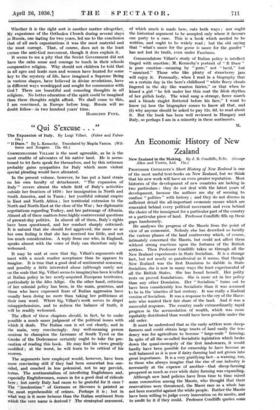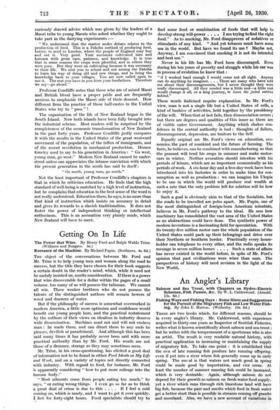An Economic History of New Zealand
PROFESSOR CONDLIFFeS Short History of New Zealand is one of the most useful text-books on New Zealand, but we think that his new work will have an even greater reputation. Most histories of the development of new countries are lacking in two particulars : they do not deal with the latest years of development, because the authors are shy of seeming to confuse " politics " with history ; and they do not discuss in sufficient detail the all-important economic causes which are concealed behind every political movement and even behind the choice of the immigrant for a particular part of the country or a particular piece of land. Professor Condliffe fills up these gaps handsomely.
He analyses the progress of the Maoris from the point of view of an economist. Nobody else has described so lucidly the various phases of the land controversy which, of course, intimately concerned the Maoris, but could not affect them without strong reactions upon the fortunes of the British settlers. Then Professor Condliffe takes us through all the New Zealand experiments in State Socialism. It is a strange fact, but not nearly so paradoxical as it seems, that though New Zealand was the first Dominion to dabble in State Socialism, she is now in many ways the least experimental of all the British States. She has found herself. Her polity rests on proved foundations. She is more set in her policy than any other Dominion. Her " Socialism " turns out to have been considerably less Socialistic than it was assumed t3 be in the 'nineties of last century. It was really a Radical version of Socialism. It was a response to the cry of the Have- nots who wanted their fair share of the land. And it was a successful response. The country made extraordinarily rapid progress in the accumulation of wealth, which was more equitably distributed than would have been possible under the old order.
It must be understood that as the early settlers were sheep- farmers and could obtain large tracts of land easily the ten- dency was for agriculture to become " large-scale " farming. In spite of all the so-called Socialistic legislation which broke down the quasi-monopoly of the first landowners, it would hardly have been possible for ownership to have become as well balanced as it is now if dairy-farming had not grown into great importance. It is a very gratifying fact—a warning, too, to those who always imagine that the rise of one industry is necessarily at the expense of another—that sheep-farming prospered as much as ever while dairy farming was expanding. Although new land policies have from time te time raised some commotion among the Maoris, who thought that their reservations were threatened, the Maori race as a whole has not been resentful against the white people. Rather the Maoris have been willing to judge every innovation on its merits, and to profit by it if they could. Professor Condliffe quotes some
curiously shrewd advice which was given by the leaders of a Maori tribe to young Maoris who asked whether they ought to take part in the dairying experiments ;—
" We understand that the matter under debate relates to the production of food. This is a Pakeha method of producing food, butter, to send to London, where the people of England may buy and eat it. Very good. Your ancestors cultivated to and kumara with great care, patience, and knowledge. It is - true that in some seasons the crops were plentiful, and in others they were poor. But they went on cultivating because it was necessary to their life.' We sent you to school and out among the Pakeha to learn his way of doing old• and new things, •and to bring the knowledge back to your villages. You are now called upon to use it. The rest you have in you from your forefathers. Therefore we say—go ahead."
Professor Condliffe notes that those who are of mixed Maori and British blood have a proper pride and are frequently anxious to emphasize the Maori side of their. descent. How different from the practice of those half-castes in the United States who try to " pass " !
The organization of the life of New Zealand began in the South Island. Now both islands have been fully brought into the industrial scheme. Most readers will be surprised by the completeness of the economic transformation of New Zealand in the past forty years. Professor Condliffe justly compares it with the results in the United States of the great westward movement of the population, of the influx of immigrants, and
of the recent revolution in mechanical production. Horace Greeley used to say to his generation in America : " Go west, young man, go west." Modem New Zealand cannot be under-
stood unless one appreciates the intense conviction with which the present generation in the south has said to itself :
" Go north, young man, go north."
Not the least important of Professor Condliffe's chapters is that in which he criticizes education. He finds that the high standard of well-being is matched by a high level of instruction,
but he complains that education in the best sense of the word is not really understood. Education there, he says, is no more than that kind of instruction which insists on accuracy in detail and gives its rewards to a slavish traditionalism. It does not foster the power of independent thinking or intellectual enthusiasm. This is an accusation very plainly made,- which New Zealand will have to meet. -





































 Previous page
Previous page